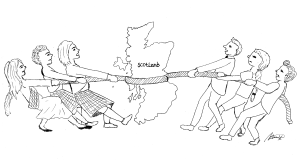
 When it was announced that a referendum would be held to decide whether Scotland would become independent, I really didn’t care. What the media was trumping up to be one of the most monumental turning points in recent British history barely crossed my consciousness.
When it was announced that a referendum would be held to decide whether Scotland would become independent, I really didn’t care. What the media was trumping up to be one of the most monumental turning points in recent British history barely crossed my consciousness.
That was until last Sunday when a poll for British newspaper The Sunday Telegraph put the “yes” vote for independence in the lead at 54 percent, and for the first time showed that it was all too close to call. That was when I realized that I believed that voting for independence would be a terrible, terrible decision.
Ever since the referendum was announced, British media have been bombarded with claims made by both campaigns about why Scotland should or should not vote for independence, with a large focus on the risks that an independent Scotland would face regarding its nuclear status, financial stability and relationship with Europe.
On one hand, these are all entirely legitimate policy concerns that alone are enough to convince me that by going independent, Scotland will be putting itself in an immensely, unnecessarily difficult starting point. But the truth is, those who are planning to vote for independence are fully aware of the difficulties for which they are setting themselves up, and that’s a terrifying credit to the amount they despise England.
I could pile on, as both campaigns have, numerous emotional pleas to history and to the great accomplishments the union has made together, as a justification for rejecting independence. With the welfare state founded by an Englishman, the National Health Service founded by a Welshman and the great British Broadcasting Corporation founded by a Scot, there is a lot that we, as a union, have to be proud of.
It is one of the United Kingdom’s great strengths that while each part has its own culture, together we represent an impressive and historic united power. But while it is this kind of emotion — this need to evaluate how we consider our culture, our nationality and ourselves — that is primarily driving the debates surrounding the referendum, there are also some logical realities that need to be faced.
By going independent, Scotland would be forgoing the support of a team. The benefits that Scotland gained in the shape of pensions and the NHS once made the union worthwhile, but those benefits have long since lost their shine. This means that for every key issue, Scotland needs to ask itself whether it’s going to do a better job meeting national needs on its own, or as part of the United Kingdom. This consideration is most essential regarding social justice.
Undoubtedly, there are numerous reasonable concerns about the security of an independent Scotland, militarily, financially and in terms of its relationship with Europe. But these are all issues that, if Scotland did declare independence, it would one way or another be able to deal with.
But it is fundamentally wrong for the Scottish National Party to tell the Scottish population that independence will give them the ability to construct a more socially democratic nation. To claim that a Scottish government would be better equipped to deal with social justice issues that we face in the United Kingdom — particularly regarding poverty, employment and education — is misleading.
With a disproportionately aging population and high levels of public spending per head, Scotland faces these issues perhaps even more fiercely than the rest of Britain. But they are nonetheless issues that we all need to address, and with the SNP offering no tax changes except cuts to corporation tax, it seems naive to think that a Scottish government will more responsibly create the kind of necessary mass social change on its own.
The United Kingdom, like so many other nations, is still struggling to recover from a devastating financial recession. As a result, the entire population is suffering brutal government spending budget cuts and stiff financial burdens. On top of that, after decades of political and social upheaval, we’re having a bit of an identity crisis, still adjusting to no longer being the dominant global power and trying to establish what exactly our place is on the global stage.
Now is not the time for Scotland to bail on the team. In a time when the entire population is struggling, Scottish First Minister Alex Salmond is grievously misleading voters, offering independence as the best solution. Let’s not forget that England is Scotland’s main trading partner, meaning that independence would essentially make Scotland’s best market — the oldest and arguably most successful single market in the world — its competition.
A united Britain, with its pool of resources, relationships and expertise undoubtedly has a better chance of coping with the fragile economy than one facing a breakup. Disagreements with the current government do not justify voting for independence — we all get to exercise that brilliant one-man, one-vote policy in a couple of years. But what cannot be denied is that this is a fight we, as the U.K., need to make together.
It may sound brutal, but by voting to leave the union, Scotland would simply be abandoning ship. Independence may invoke for some a national pride, but this desire to stick it to England needs to be measured by some cold reality. Independence really means isolation. It means being subject to further European intervention. It means being crushed by issues of security, both financial and military. It means being left with a smaller voice on the global stage.
A team is stronger than an individual, and in a time where we, as a nation, face countless international and domestic crises, the United Kingdom really is better together.
Jess Kelham-Hohler is a sophomore in the College, originally from London. She serves as Guide editor for The Hoya and is a member of the Brilliantly British Club board.









